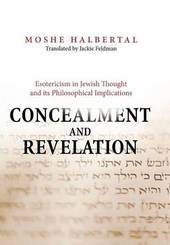
|
Concealment and Revelation: Esotericism in Jewish Thought and its Philosophical Implications
Hardback
Main Details
| Title |
Concealment and Revelation: Esotericism in Jewish Thought and its Philosophical Implications
|
| Authors and Contributors |
By (author) Moshe Halbertal
|
|
Translated by Jackie Feldman
|
| Physical Properties |
| Format:Hardback | | Pages:208 | | Dimensions(mm): Height 235,Width 152 |
|
| Category/Genre | Literature - history and criticism
Philosophy
Judaism - sacred texts |
|---|
| ISBN/Barcode |
9780691125718
|
| Classifications | Dewey:001.01 |
|---|
| Audience | | Professional & Vocational | | Tertiary Education (US: College) | |
|---|
|
Publishing Details |
| Publisher |
Princeton University Press
|
| Imprint |
Princeton University Press
|
| Publication Date |
16 September 2007 |
| Publication Country |
United States
|
Description
During the twelfth and thirteenth centuries, great new trends of Jewish thought emerged whose widely varied representatives--Kabbalists, philosophers, and astrologers--each claimed that their particular understanding revealed the actual secret of the Torah. They presented their own readings in a coded fashion that has come to be regarded by many as the very essence of esotericism. Concealment and Revelation takes us on a fascinating journey to the depths of the esoteric imagination. Carefully tracing the rise of esotericism and its function in medieval Jewish thought, Moshe Halbertal's richly detailed historical and cultural analysis gradually builds conceptual-philosophical force to culminate in a masterful phenomenological taxonomy of esotericism and its paradoxes. Among the questions addressed: What are the internal justifications that esoteric traditions provide for their own existence, especially in the Jewish world, in which the spread of knowledge was of great importance? How do esoteric teachings coexist with the revealed tradition, and what is the relationship between the various esoteric teachings that compete with that revealed tradition? Halbertal concludes that, through the medium of the concealed, Jewish thinkers integrated into the heart of the Jewish tradition diverse cultural influences such as Aristotelianism, Neoplatonism, and Hermeticisims. And the creation of an added concealed layer, unregulated and open-ended, became the source of the most daring and radical interpretations of the tradition.
Author Biography
Moshe Halbertal is professor of philosophy at the Hebrew University of Jerusalem, a fellow at the Shalom Hartman Institute, and the Gruss Professor at New York University Law School. He is the author of "People of the Book" and the coauthor (with Avishai Margalit) of "Idolatry".
Reviews"Halbertal explains complex issues clearly and gracefully, moving smoothly from dense kabbalistic passages to abstruse texts on medieval philosophy in a way that allows the unspecialized reader to follow his train of thought without plumbing the depths of each theological system to which he refers."--Jewish Book World "This concise and brilliant book ... provides great insight into individual thinkers like Ibn Ezra, whose astrological beliefs are frequently overlooked by his readers, and Rambam, whose explicit esotericism has perplexed readers for centuries... A translation of the 2001 Hebrew edition, this very scholarly yet highly readable work will be recognized as a masterful work for many years to come."--Tradition "Halbertal's book outlines a challenging theory in the intellectual history of Jewish creativity. He does not rely on new material but offers a superb interpretation of available material. This book undoubtedly represents a major contribution to the discourse on the character and the varieties of ancient and medieval Jewish thought."--Dov Schwartz, Journal of Religion
|